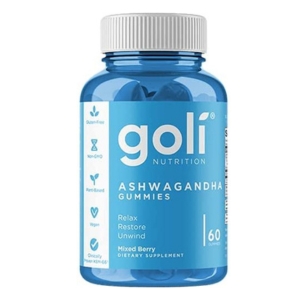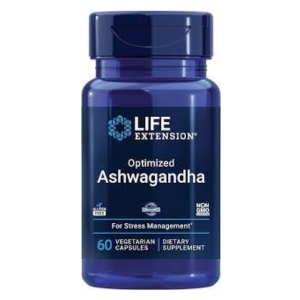 Expert's opinion
Expert's opinion
The article is a subjective view on this topic written by writers specializing in medical writing.
It may reflect on a personal journey surrounding struggles with an illness or medical condition, involve product comparisons, diet considerations, or other health-related opinions.
Although the view is entirely that of the writer, it is based on academic experiences and scientific research they have conducted; it is fact-checked by a team of degreed medical experts, and validated by sources attached to the article.
The numbers in parenthesis (1,2,3) will take you to clickable links to related scientific papers.
Best Ashwagandha Supplement 2024: Top 5 Dietitian’s Pick
All articles are produced independently. When you click our links for purchasing products, we earn an affiliate commission. Learn more about how we earn revenue by reading our advertise disclaimer.
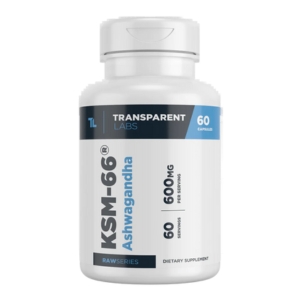
Transparent Labs KSM-66 Ashwagandha
- No artificial sweeteners or coloring
- Non-GMO, vegan-friendly
- Capsule form
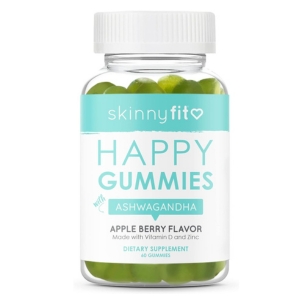
SkinnyFit Happy Gummies Ashwagandha
- In gummy form
- Vegan-friendly, non-GMO (genetically modified organisms), and gelatin-free
- Includes Vitamin D and Zinc
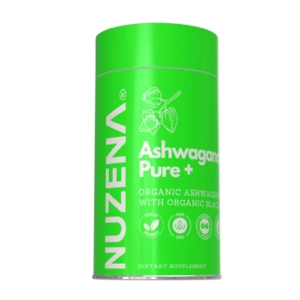
Nuzena Ashwagandha Pure+
- GMP-certified (Good Manufacturing Practices)
- Made in FDA-registered facilities
- Third-Party Tested
Are you interested in alternative medicine? Using a supplement that can help your body be healthy and in balance naturally is an example of using a form of alternative medicine treatment. Ashwagandha is one of the herbal plants used for this purpose; it’s a little bush with yellow flowers, known as Withania somnifera. It has been used for thousands of years in the Asian Indian Ayurvedic practice of traditional medicine.
Ashwagandha is a native plant to Southeast Asia, India, the Middle East, and Africa. Also known as “Indian ginseng” or “winter cherry,” it’s an important herb used in Ayurvedic medicine.
It is often used as an Ashwagandha extract to treat physical and mental stress, anxiety, and insomnia, improve memory, increase energy control blood sugar levels, and help with fertility and depression.[1] This supplement is also offered as a nootropic supplement, meaning for improves cognitive function.[2]
Read on for the best ashwagandha supplement, a Dietitian’s Pick; the items designated with the shelf tag, “Dietitian’s Pick,” meet the FDA’s criteria for “healthy” food, thus meeting standards used for institutional settings.
Best Ashwagandha Supplement On The Market In (April. 2024)
- Transparent Labs KSM-66 Ashwagandha – Editor’s Choice
- SkinnyFit Happy Gummies Ashwagandha – Best High-End
- Nuzena Ashwagandha Pure+ – Most Transparent
- Goli Ashwagandha – Best Gummy
- Life Extension Optimized Ashwagandha – Best Value
5 Best Ashwagandha Supplements In 2024
Transparent Labs KSM-66 Ashwagandha
A dietary supplement that only includes ashwagandha in its capsules, ideal for a person who is already consuming other over-the-counter supplements, such as vitamin D.
- No artificial sweeteners or coloring
- Non-GMO, vegan-friendly
- Capsule form
- Complicated return policy
Transparent Labs provides an ashwagandha supplement that includes only the ashwagandha if you are looking for just this type of supplement. It includes the concentrated KSM-66® organic ashwagandha root extract, which helps improve sleep, reduces stress, balances the immune system, supports a healthy mood, and improves cognitive health.
Adding this type of ashwagandha includes at least 5% bioactive withanolides at the clinically studied dosage of 600mg. Withanolides are naturally occurring bioactive molecules with anti-inflammatory properties[3]. This may be the best ashwagandha supplement for testosterone since its dosage has been studied in men and has been found[4] to improve semen quality via the optimization of male hormones.
The dosage is one capsule per day with or without a meal. You can get a discount on other supplements if you bundle this supplement with other products. You can get a 60-day money-back guarantee, but the return policy can be complicated.
SkinnyFit Happy Gummies Ashwagandha
A flavorful ashwagandha gummy supplement that identifies its source as ashwagandha root extract, is used to relieve stress, support immunity, and improve mood.
- In gummy form
- Vegan-friendly, non-GMO (genetically modified organisms), and gelatin-free
- Includes Vitamin D and Zinc
- Added sugar and glucose syrup
- Vitamin D exceeds 100% of daily value (the company claims 1,000%)
SkinnyFit offers the tastiest ashwagandha supplement in gummy form. It’s tasty because of its natural tart cherry flavor and added natural sugars, with spinach as a natural colorant. This gummy supplement is mood-boosting to help reduce stress. It also comes with vitamin D and Zinc added to support the immune system.
Although the additions of vitamin D and Zinc are not bad, vitamin D is a fat-soluble vitamin that can accumulate to toxic levels if consumed in excess. The tolerable upper intake level[5] for men and women over 18 is 100 mcg per day; this supplement provides 200 mcg per dose (two gummies), twice the upper limit cited above. We would caution you to look at all current supplements and nutrition facts labels that you may be taking to make sure it does not include extra vitamin D.
The recommended dosage is two gummies per day to help with reducing stress, and weight management, support the immune system, increase energy, and promote calmness. You can get a 20% discount if you subscribe, hassle-free with a 90-day money-back guarantee.
Nuzena Ashwagandha Pure+
An ashwagandha product that includes antioxidants and an antibacterial ingredient (i.e., black pepper extract).
- GMP-certified (Good Manufacturing Practices)
- Made in FDA-registered facilities
- Third-party Tested
- No money-back guarantee
Nuzena includes organic black pepper extract in its organic ashwagandha supplement capsules. This unique addition contributes to optimizing nutrient absorption[6] and stimulates ashwagandha bioavailability.
A small study noted that a high concentration of a full-spectrum ashwagandha root extract could safely and effectively improve a person’s ability to resist stress[7]. This is often the adaptogen use of ashwagandha for conditions related to stress.
The recommended dosage is two capsules per day, one capsule in the middle of the day and one in the evening. This is a third-party tested supplement, and you have access to the name of the third party, the report, and the person who has signed the report. You can get a good discount if you buy in bulk with a 30-day return policy, as long as the product is returned unused and unopened; this is not a guaranteed refund, however.
Goli Ashwagandha
This ashwagandha supplementation comes with a conservative dose of vitamin D to support immune system health.
- Non-GMO, vegan-friendly
- Includes Vitamin D
- Made in an allergen-free facility
- The dosage includes four gummies per day.
Goli Nutrition provides KSM-66®, a concentrated form of ashwagandha root extract and vitamin D at a safe, low dose[8]. This ashwagandha supplement helps reduce stress, helps with relaxation, controls stress-related food cravings, improves sleep quality, supports memory and concentration, and possibly helps with sexual function in women in need of a boost.
You can get this supplement in a gummy form; instead of using gelatin, the manufacturer uses pectin found in fruit peels, making it vegan-friendly. The dosage is two gummies twice a day and is taken both in the morning and in the evening.
You can get various discounts from a subscription to different supplements that include ashwagandha, a subscription of five bottles of Ashwagandha supplement, or a subscription of just one bottle every four weeks. You also get a 30-day money-back guarantee. You can return the product unopened or opened.
Life Extension Optimized Ashwagandha
Made of Sensoril®, which includes the extract from both the root and leaf, to support healthy memory, encourage management of stress.
- Low cost
- Non-GMO
- Additional savings with a subscription
- May cause sleepiness
Life Extension has an optimized ashwagandha supplement that includes Sensoril®, an extract from both the root and leaf of the plant. A study[9] from 2008 claims that it helps with stress management promotes memory health, improves stress response, and healthy cognitive function.
However, in the disclosures, it is noted that one author is an employee of the patent holder of Withania Somnifera extract sold under the trade names Essentra® and Sensoril®. The second author is an employee of NutraGenesis LLC, the company that sells Withania Somnifera extract under the trade names Essentra® and Sensoril®. However, a more recent study[10] (2021) affirms these findings.
The recommended dosage is one capsule twice a day on an empty stomach. This has the lowest cost of all the reviewed supplements, with an additional discount for a 12-month money-back guarantee, hassle-free.
How To Choose The Best Ashwagandha Supplement
Dosage
Dosage is not easy to calculate because there aren’t any standard recommendations on what is an adequate dosage for interventions into any particular health condition. We can only go on the dosages used in studies that demonstrate some benefits. For example, in a small study of 64 subjects in a randomized, double-blind placebo-controlled study[11], the use of 300mg showed a significant reduction in all the stress assessments and the levels of cortisol, the stress hormone, compared to the control group.
In another study[12], the benefits of ashwagandha and fertility in men with 5 grams/day (5000 mg/day) for three months showed some promise of rebooting the reproductive hormones in men.
In a third study[13], 69 subjects were given three different doses, one at 125 mg once a day, 125 mg twice a day, and 250 mg twice a day. The subjects taking 125 mg once a day showed significant improvement in cortisol levels, C-reactive protein, pulse rate, and blood pressure.
Therefore, in those three studies related to three different findings, you get a range between 125mg and 5000mg. That is a huge range, and if the low dose seems to be already giving benefits, a good choice would be to choose the low dose of 125 mg. However, at all doses, there seemed to be negligible risk or toxicity.
Third-Party Tested
Supplement companies are not obligated to submit their supplements for third-party testing. Still, it’s a good indicator that there is a level of care from the manufacturer to show their products are safe for consumption.
The third-party testing labs can test for ingredient potency and accuracy, heavy metals, mold, yeast, bacteria, and pesticides. To identify if a supplement is third-party tested, you can look for the seal on the product label. The most common third-party testers are U.S Pharmacopeia (USP), ConsumerLab.com, and NSF International[14].
Price
The prices also vary significantly; the range is between $7-$40. The gummy vitamins seem to be the higher-priced, possibly for the extra effort of making it flavorful. The capsules, which are swallowed and simple to make, can be more affordable. But don’t be fooled to think that a higher-priced supplement is better; the dietary supplements are not regulated by the Food and Drug Administration (FDA). Therefore you are not guaranteed good quality, yet, third-party testing certification is reassuring.
What Is Ashwagandha Used For?
According to a journal review, it has cognition-promoting effects, found useful in neurodegenerative diseases such as Parkinson’s, Huntington’s, and Alzheimer’s; it is anti-inflammatory and anti-arthritic and useful in c Rheumatoid and Osteoarthritis[15].
You can now get this herb in a supplement form, and the options are pretty impressive. You can also get pure Ashwagandha extract supplements in which ashwagandha is the only ingredient.
Other ashwagandha products are available as organic ashwagandha extract, organic ashwagandha powder, organic ashwagandha root powder, ashwagandha gummies, and ashwagandha capsules in liquid drops or powder form.
Many ashwagandha supplements will be made of root extract, while a few will include an extract from the leaf. Traditionally, many parts of the plant are used, like the roots, seeds, leaves, fruit, flowers, bark, and stem. There is a lot of research about Ashwagandha, but many of those studies often say there is a promise or it may give certain benefits but often suggest further research is needed[16].
Benefits Of Ashwagandha Supplements
When using the best ashwagandha supplements, you may have some health benefits like control of stress hormones, limiting stress that causes weight gain, healthy blood sugar levels, or testosterone boosters.
However, it’s important to mention that, since ashwagandha is a bioactive substance, certain people should not take an ashwagandha product, such as those pregnant, breastfeeding, or those with thyroid or autoimmune diseases.
Final Thought
Finding the best ashwagandha supplements can be tricky; there aren’t any standardized ashwagandha dosage requirements per age, like other dietary supplements offering vitamins and minerals. However, many studies do some type of research using varying dosages.
The reported benefits are reduced stress and anxiety, decreased symptoms of mental health conditions like depression, a testosterone-boosting property, promotion of blood sugar control, reduced inflammation, improved brain function and memory, and improved sleep.
All these benefits can also be obtained through regular sleep, a varied intake of fruits and vegetables, a meal pattern, and exercise. Of course, having natural herbs that may contain active compounds that can help with these does not hurt, but its effectiveness is still up for debate. Most research indicates promising benefits, but many studies end with more research or larger studies being needed.
Something to keep in mind is that the ashwagandha herb isn’t the only one that carries these potential benefits. Other natural plants that are often used for their similar health benefits are the magnolia bark extract, a plant from China[17]; pine bark extract, a plant found in the south of France[18]; maca root extract, a plant found in Peru[19]; cordyceps mushroom extract from China[20]; Turmeric root powder from India[21]; and ginger root powder from Southeast Asia[22].
Frequently Asked Questions
The best ashwagandha supplement brands are the ones that are third-party tested and disclose all their results, including the lab used for the testing.
The use of root extract from the Ashwagandha plant is the best for efficacy[23]; products with black pepper improve absorption
Each manufacturer has different recommendations; it’s advised to follow the manufacturer’s recommendation.
It depends on the ashwagandha supplement dosage and recommendation per manufacturer.
Like any edible dietary supplement, there is a best-by date or expiration date. Follow the manufacturer’s printed expiration dates and throw away any expired supplements.
+ 23 sources
Health Canal avoids using tertiary references. We have strict sourcing guidelines and rely on peer-reviewed studies, academic researches from medical associations and institutions. To ensure the accuracy of articles in Health Canal, you can read more about the editorial process here
- Tandon, N. and Yadav, S.S. (2020). Safety and clinical effectiveness of Withania Somnifera (Linn.) Dunal root in human ailments. Journal of Ethnopharmacology, [online] 255, p.112768. doi:10.1016/j.jep.2020.112768.
- Singh, N., Bhalla, M., De Jager, P. and Gilca, M. (2011). An Overview on Ashwagandha: A Rasayana (Rejuvenator) of Ayurveda. African Journal of Traditional, Complementary and Alternative Medicines, [online] 8(5S). doi:10.4314/ajtcam.v8i5s.9.
- Lopresti, A.L. and Smith, S.J. (2021). Ashwagandha (Withania somnifera) for the treatment and enhancement of mental and physical conditions: A systematic review of human trials. Journal of Herbal Medicine, [online] 28, p.100434. doi:10.1016/j.hermed.2021.100434.
- National Institutes of Health (2017). Vitamin D. [online] Nih.gov. Available at: https://ods.od.nih.gov/factsheets/VitaminD-HealthProfessional/.
- National Institutes of Health (2017). Vitamin D. [online] Nih.gov. Available at: https://ods.od.nih.gov/factsheets/VitaminD-HealthProfessional/.
- White, P.T., Subramanian, C., Motiwala, H.F. and Cohen, M.S. (2016). Natural Withanolides in the Treatment of Chronic Diseases. Advances in Experimental Medicine and Biology, [online] pp.329–373. doi:10.1007/978-3-319-41334-1_14.
- Ahmad, M.K., Mahdi, A.A., Shukla, K.K., Islam, N., Rajender, S., Madhukar, D., Shankhwar, S.N. and Ahmad, S. (2010). Withania somnifera improves semen quality by regulating reproductive hormone levels and oxidative stress in seminal plasma of infertile males. Fertility and Sterility, [online] 94(3), pp.989–996. doi:10.1016/j.fertnstert.2009.04.046.
- Takooree, H., Aumeeruddy, M.Z., Rengasamy, K.R.R., Venugopala, K.N., Jeewon, R., Zengin, G. and Mahomoodally, M.F. (2019). A systematic review on black pepper (Piper nigrum L.): from folk uses to pharmacological applications. Critical Reviews in Food Science and Nutrition, [online] 59(sup1), pp.S210–S243. doi:10.1080/10408398.2019.1565489.
- Chandrasekhar, K., Kapoor, J. and Anishetty, S. (2012). A Prospective, Randomized Double-Blind, Placebo-Controlled Study of Safety and Efficacy of a High-Concentration Full-Spectrum Extract of Ashwagandha Root in Reducing Stress and Anxiety in Adults. Indian Journal of Psychological Medicine, [online] 34(3), pp.255–262. doi:10.4103/0253-7176.106022.
- Biswajit Auddy, Jayram Hazra, Mitra, A. and Shibnath Ghosal (2008). A Standardized Withania Somnifera Extract Significantly Reduces Stress-Related Parameters in Chronically… [online] ResearchGate. Available at: https://www.researchgate.net/publication/242151370_A_Standardized_Withania_Somnifera_Extract_Significantly_Reduces_Stress-Related_Parameters_in_Chronically_Stressed_Humans_A_Double-Blind_Randomized_Placebo-Controlled_Study
- Gopukumar, K., Thanawala, S., Somepalli, V., Rao, T.S.S., Thamatam, V.B. and Chauhan, S. (2021). Efficacy and Safety of Ashwagandha Root Extract on Cognitive Functions in Healthy, Stressed Adults: A Randomized, Double-Blind, Placebo-Controlled Study. Evidence-Based Complementary and Alternative Medicine, [online] 2021, pp.1–10. doi:10.1155/2021/8254344.
- Chandrasekhar, K., Kapoor, J. and Anishetty, S. (2012). A Prospective, Randomized Double-Blind, Placebo-Controlled Study of Safety and Efficacy of a High-Concentration Full-Spectrum Extract of Ashwagandha Root in Reducing Stress and Anxiety in Adults. Indian Journal of Psychological Medicine, [online] 34(3), pp.255–262. doi:10.4103/0253-7176.106022.
- Gupta, A., Mahdi, A.A., Shukla, K.K., Ahmad, M.K., Bansal, N., Sankhwar, P. and Sankhwar, S.N. (2013). Efficacy of Withania somnifera on seminal plasma metabolites of infertile males: A proton NMR study at 800MHz. Journal of Ethnopharmacology, [online] 149(1), pp.208–214. doi:10.1016/j.jep.2013.06.024.
- Biswajit Auddy, Jayram Hazra, Mitra, A. and Shibnath Ghosal (2008). A Standardized Withania Somnifera Extract Significantly Reduces Stress-Related Parameters in Chronically… [online] ResearchGate. Available at: https://www.researchgate.net/publication/242151370_A_Standardized_Withania_Somnifera_Extract_Significantly_Reduces_Stress-Related_Parameters_in_Chronically_Stressed_Humans_A_Double-Blind_Randomized_Placebo-Controlled_Study
- Loria, K. (2019). How to Choose Supplements Wisely. [online] Consumer Reports. Available at: https://www.consumerreports.org/supplements/how-to-choose-supplements-wisely-a2238386100/
- Cleveland Clinic. (2021). What Is Ashwagandha? [online] Available at: https://health.clevelandclinic.org/what-is-ashwagandha/
- Poivre, M. and Duez, P. (2017). Biological activity and toxicity of the Chinese herb Magnolia officinalis Rehder & E. Wilson (Houpo) and its constituents. Journal of Zhejiang University-SCIENCE B, [online] 18(3), pp.194–214. doi:10.1631/jzus.b1600299.
- Ryan, J., Croft, K., Mori, T., Wesnes, K., Spong, J., Downey, L., Kure, C., Lloyd, J. and Stough, C. (2008). An examination of the effects of the antioxidant Pycnogenol® on cognitive performance, serum lipid profile, endocrinological and oxidative stress biomarkers in an elderly population. Journal of Psychopharmacology, [online] 22(5), pp.553–562. doi:10.1177/0269881108091584.
- Gonzales-Arimborgo, C., Yupanqui, I., Montero, E., Alarcón-Yaquetto, D., Zevallos-Concha, A., Caballero, L., Gasco, M., Zhao, J., Khan, I. and Gonzales, G. (2016). Acceptability, Safety, and Efficacy of Oral Administration of Extracts of Black or Red Maca (Lepidium meyenii) in Adult Human Subjects: A Randomized, Double-Blind, Placebo-Controlled Study. Pharmaceuticals, [online] 9(3), p.49. doi:10.3390/ph9030049.
- Panda, A. and Swain, K. (2011). Traditional uses and medicinal potential of Cordyceps sinensis of Sikkim. Journal of Ayurveda and Integrative Medicine, [online] 2(1), p.9. doi:10.4103/0975-9476.78183.
- NCCIH. (2019). Turmeric. [online] Available at: https://www.nccih.nih.gov/health/turmeric
- Khandouzi, N., Shidfar, F., Rajab, A., Rahideh, T., Hosseini, P. and Mir Taheri, M. (2015). The effects of ginger on fasting blood sugar, hemoglobin a1c, apolipoprotein B, apolipoprotein a-I and malondialdehyde in type 2 diabetic patients. Iranian journal of pharmaceutical research : IJPR, [online] 14(1), pp.131–40. Available at: https://www.ncbi.nlm.nih.gov/pmc/articles/PMC4277626/
- Tandon, N. and Yadav, S.S. (2020). Safety and clinical effectiveness of Withania Somnifera (Linn.) Dunal root in human ailments. Journal of Ethnopharmacology, [online] 255, p.112768. doi:10.1016/j.jep.2020.112768.

